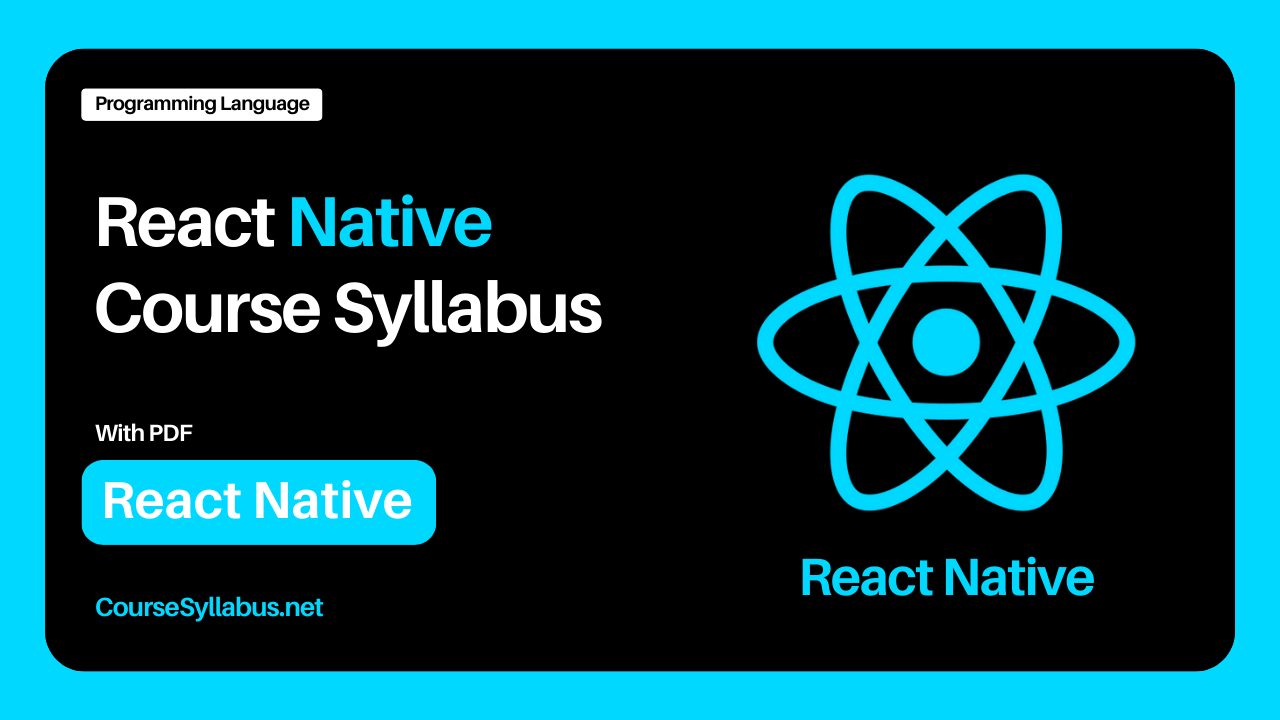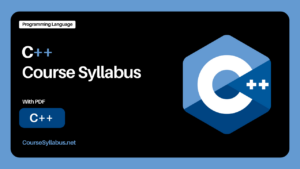React Native is a framework developed by Facebook for building mobile applications using JavaScript and React. It allows developers to create cross-platform apps for iOS and Android with native-like performance and user experiences. With features like hot reloading and reusable components, React Native streamlines development while leveraging a large community and ecosystem for support and resources.
React Native Course Syllabus
Module 1: Introduction to React Native
- Overview of React Native
- Understanding the basics of React Native architecture
- Setting up the development environment (Node.js, npm, React Native CLI)
- Creating a new React Native project
- Exploring the project structure
Module 2: React Native Components
- Understanding React Native components
- Exploring built-in components (View, Text, Image, ScrollView, etc.)
- Styling React Native components using StyleSheet
- Handling user input with TextInput and Button components
- Organizing components with Lists (FlatList, SectionList)
Module 3: Navigation in React Native
- Introduction to navigation concepts in React Native
- Using React Navigation library for navigation
- Setting up stack navigation
- Implementing drawer navigation
- Configuring tab navigation
Module 4: State Management
- Understanding state and props in React Native
- Managing state using useState and useEffect hooks
- Introducing Redux for state management
- Implementing Redux actions, reducers, and store
- Integrating Redux with React Native application
Module 5: Networking and APIs
- Making HTTP requests in React Native
- Using fetch API to interact with RESTful APIs
- Handling API responses
- Authentication with APIs (JWT, OAuth)
- Storing API data locally using AsyncStorage
Module 6: Styling and Theming
- Advanced styling techniques in React Native
- Theming using StyleSheet and global styles
- Integrating third-party styling libraries (Styled Components, CSS-in-JS)
- Responsive design principles in React Native
- Animation and gestures in React Native
Module 7: Working with Native Modules
- Integrating native code with React Native
- Introduction to Native Modules
- Writing custom native modules for React Native
- Bridging native code to React Native JavaScript
Module 8: Testing and Debugging
- Introduction to testing in React Native
- Unit testing with Jest
- Integration testing with Detox
- Debugging React Native applications
- Performance optimization techniques
Module 9: Deployment
- Preparing React Native app for deployment
- Generating release builds for Android and iOS
- App store submission process for Android and iOS
- Continuous Integration and Deployment (CI/CD) for React Native apps
- Handling updates and versioning
Module 10: Advanced Topics and Future Trends
- Exploring advanced topics in React Native
- Deep dive into specific libraries or features (e.g., Reanimated, Hermes, TurboModules)
- Future trends and developments in the React Native ecosystem
- Discussion on Flutter vs. React Native vs. other cross-platform frameworks
- Project Showcase and wrap-up
Key Features of React Native:
- Cross-platform Compatibility: React Native enables developers to write code once and deploy it on both iOS and Android platforms, saving time and effort.
- Native Performance: By accessing device APIs directly from JavaScript, React Native ensures that applications deliver high performance and native-like user experiences.
- Hot Reloading: React Native offers hot reloading, allowing developers to see changes made to the code in real time without recompiling the entire application, speeding up the development process.
- Component Reusability: React Native promotes a component-based architecture, where UI elements are broken down into reusable components, enhancing code maintainability and scalability.
- Community Support: React Native has a vibrant community of developers and contributors, providing access to a wide range of pre-built components, third-party integrations, and solutions to common development challenges.
- Facebook Backing: React Native is actively maintained by Facebook and has been used in the development of several mobile applications, ensuring ongoing support, updates, and improvements.
React Native Learning Resources
There are many resources available for learning React Native ranging from online tutorials and courses to books and interactive platforms. Here are some popular options:
Time for Learning React Native
- Basic Familiarity (1-2 weeks): For those with JavaScript and React knowledge, grasp React Native fundamentals in a couple of weeks.
- Intermediate Level (2-3 months): Dive deeper into Redux, asynchronous operations, animations, and native module integration over 2-3 months.
- Advanced Mastery (6+ months): Achieve proficiency through continuous practice, focusing on optimization, testing, deployment, and exploring advanced features over six months or more.
React Native Developer Career Opportunities
- Mobile App Development: React Native developers find opportunities in companies of all sizes, building cross-platform mobile applications.
- Freelancing: React Native expertise opens doors to freelance projects and consulting gigs for various clients.
- Tech Companies: Work at tech giants like Facebook or startups leveraging React Native for innovative mobile solutions.
- Remote Work: Enjoy flexibility with remote positions, as React Native development can be done from anywhere.
- Cross-Platform Tools: Explore roles in companies developing cross-platform development tools or frameworks.
- Education: Transition into teaching roles, sharing React Native knowledge through courses, coaching, or tutorials.
- Entrepreneurship: Use React Native skills to launch your own apps or tech businesses, tapping into the mobile app market.
Conclusion:
React Native provides developers with diverse career opportunities in mobile app development. Whether working for tech giants, startups, or freelancing, React Native expertise is in high demand across industries. With its cross-platform capabilities and continuous growth, React Native offers an exciting pathway for developers to build innovative applications and advance their careers in the dynamic field of mobile development.




